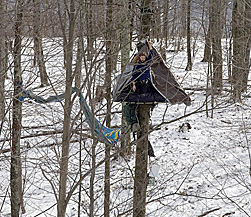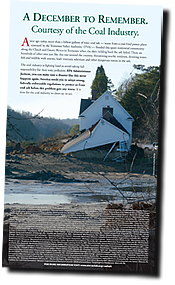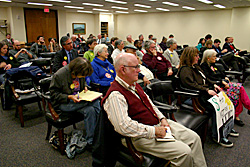
By_Bill_Kovarik
An often pointed but unfailingly polite debate Thursday demonstrated a wide gulf between environmental and coal industry positions on Appalachia’s environmental woes.
Robert F. Kennedy Jr., president of the Waterkeeper Alliance, challenged coal baron Don Blankenship to be honest about the coal industry’s environmental record, especially mountaintop removal mining.

“This is the worst environmental crime that has ever happened in our history,” Kennedy said, advocating an end to MTR and a gradual shift to renewable energy sources. “We all have a moral obligation to stop this from happening.”
Blankenship, chairman of Massey Energy Company, said the issue was one of industry competitiveness in the face of “environmental extremism.”

Blankenship also challenged Kennedy on the cost of renewable energy, asking why more was not being developed. “If windmills are the thing to do, it will happen naturally.”
Wind is cheaper than coal power, Kennedy responded. “I’m stunned that Mr Blankenship doesn’t know that this is going on.”
The debate, a Forum on the Future of Energy, was sponsored by the University of Charleston in Charleston, WV on Thursday evening, Jan. 21.
Although the debate developed little common ground, its civil tone contrasted with the rancor of hearings and other public events in recent years.
“Its sadly rare in our society to have a serious conversation between people with opposing opinions on a sensitive issue,” said debate moderator Edwin Welch, President of the University of Charleston WV.

At one point, Blankenship was asked if there were points of agreement between himself and Kennedy.
Blankenship: “We have some agreement on the fact that the world has to be part of the solution, not just the United States, and that we have to have a competitive industry if we are going to compete in a free world… Mr. Kennedy and Mr. Gore and all these other people who espouse this environmental stuff are basically mistaken as opposed to evil, because the bottom line is that if we don’t agree that homeland security, good use of our energy, low cost electricity for our houses, low cost gas for our industry, jobs, good households, high quality of life are the objective … If we don’t agree on that, then we are fundamentally on different pages.”

Kennedy said there were a few points of agreement. “I agree with a lot of Don’s rhetoric,” Kennedy said, “but I think there is a big gap between his rhetoric and what I see happening on the ground in these communities.” Kennedy also that they agreed on opposition to free trade and that “geological carbon sequestration is a joke.”
“That’s true,” Blankenship said, referring to carbon sequestration as a joke.
Kennedy and Blankenship sharply disputed topics such as: :
• Economic impacts and benefits of coal mining for Appalachia;
Kennedy: You look at the way people are living in this state. The Hendryx study shows that the closer you live to a coal mine, the sicker you are.”
Blankenship: This industry is what made this country great. If we forget that we’re going to have to learn to speak Chinese.
• Enforcement of environmental laws;
Kennedy: In a true free market system, the price of a product would reflect all of its costs. A producer like Mr Blankenship would have to pay all of the costs of his product before he gets it to market, instead of forcing you and I and my children to pay through bad health by externalizing those costs.
Blankenship: Unfortunately the laws are so difficult and the lawsuits so common and the cost of doing business is so high … To force the coal business out of West Virginia or surface mining would be a huge mistake for household budgets, for industry and for homeland security.
• Massey Energy company’s environmental record;
Kennedy: Just this last year, Massey had 12,900 (water quality) violations — A greater concentration than even before the $20 million fine (of 2008).
Blankenship: There is no country that mines coal more safely or more envirionmentally consciously than this country, and no company that does better at that than Massey.
• The cost and benefits of renewable energy;
Kennedy: The mining industry makes a few people rich by making everyone else poor, whereas the wind industry distributes wealth and the benefits of that industry more evenly.
Blankenship: Solar energy, it works well in the daytime, but it gets cold at night. Solar… and windmill parts will be made overseas…
Kennedy and Blankenship avoided a pitched debate over climate change, with Blankenship noting that he thought it was a “hoax” and Kennedy saying that the “science is settled.” However, Blankenship said there was a practical reason for his position on climate change. “If you look at 6.5 billion tons of coal in the world to raise their quality of life its not going to be possible to change the temperature of the earth by limiting the industry in this country and taking people’s jobs away.”
Kennedy also described the biodiversity being lost through Mountaintop Removal Mining:
Kennedy: During the Pleistocene ice age, 20,000 years ago, when there were 2 and a half miles of ice above the place where I live in NY, the rest of the country became a tundra, and all the trees disappeared except for one tiny refuge in the mountains of Kentucky and West Virginia. After the ice withdrew 12,000 years ago, all of North America was reseeded from those seed stocks. And that’s why the mountains of Appalachia are so important. They are the most biologically abundant temperate forests on the planet. A typical forest, all over the world, has three dominant species of trees. Appalachia has 80.
There were also moments of levity in the debate. At one point, Blankenship said he was glad Kennedy didn’t blame him for the ice age 20,000 years ago. And moderator Edwin Welch noted at the end of the debate that he didn’t think there would be a need for any “altar calls” for the converted.
In his summary statement, Kennedy said:
Kennedy: Don says we have to choose between environmental protection on the one hand and economic prosperity on the other. I say that’s a false choice… Good environmental policy is identical to good economic policy. We want to measure or economy … based upon on how it produces jobs, and the dignity of our jobs, over the generations, over the long term, and how it preserves the value of the assets of our community. If on the other hand we want to do what Don himself and his company have been urging us to do, which is to treat the planet as if it were a business in liquidation, convert all of our natural resources to cash as quickly as possible, have a few years of pollution based prosperity, we can generate an instantaneous cash flow and the illusion of a prosperous economy, but our children are going to pay for our joy ride, and they are going to pay for it with denuded landscapes and poor health and huge cleanup costs that are going to amplify over time.
Environmental injury, particularly of the kind that is happening today in West Virginia, is deficit spending. It’s a way of loading the costs of our generation’s prosperity onto the backs of our children…. An investment in our environment is (not) a diminishment of our nation’s wealth. Its an investment in infrastructure, like telecommunications or highways.
What I would say to the coal industry is go underground, employ lots of people, and do this safely as West Virginia makes a transition to a new energy future and to the prosperity that that’s going to bring this state.
Photos by Jamie Goodman, Appalachian Voice











 On Tuesday, Duke Energy and the North Carolina Utility Commission reached a preliminary settlement on Duke’s request for a substantial rate increase on residential and commercial utilities.
On Tuesday, Duke Energy and the North Carolina Utility Commission reached a preliminary settlement on Duke’s request for a substantial rate increase on residential and commercial utilities..jpg) During yesterday’s hearing, over a dozen residents spoke out against the rate hike, citing health concerns, economy, and the lack of need for the
During yesterday’s hearing, over a dozen residents spoke out against the rate hike, citing health concerns, economy, and the lack of need for the  A representative of the North Carolina Conservation Network delivered a petition signed by over 1500 citizens asking that the rate hike request be rejected, and an attorney with the North Carolina Justice Center, testified on behalf of the disadvantaged residents of the state, noting that of the 1.3 million poor people currently living in North Carolina, none of them could afford to pay for the increase, either monetarily or physically.
A representative of the North Carolina Conservation Network delivered a petition signed by over 1500 citizens asking that the rate hike request be rejected, and an attorney with the North Carolina Justice Center, testified on behalf of the disadvantaged residents of the state, noting that of the 1.3 million poor people currently living in North Carolina, none of them could afford to pay for the increase, either monetarily or physically. After a 14-day initial review period, the Environmental Protection Agency’s regional offices followed the lead of EPA headquarters, recommending that all 79 pending mountaintop removal mining valley fill permits be remanded into a full 60-day extended review process. The extended review will closely examine potential environmental and health impacts of the valley fills on headwater streams and watersheds, and is part of the EPA’s promise of a more stringent review process for overseeing mountaintop removal coal mining. During the previous presidential administration, a change to the “fill rule” in the Clean Water Act allowed permits for mountaintop removal valley fills to be rubberstamped without conducting any environmental or health impact assessments.
After a 14-day initial review period, the Environmental Protection Agency’s regional offices followed the lead of EPA headquarters, recommending that all 79 pending mountaintop removal mining valley fill permits be remanded into a full 60-day extended review process. The extended review will closely examine potential environmental and health impacts of the valley fills on headwater streams and watersheds, and is part of the EPA’s promise of a more stringent review process for overseeing mountaintop removal coal mining. During the previous presidential administration, a change to the “fill rule” in the Clean Water Act allowed permits for mountaintop removal valley fills to be rubberstamped without conducting any environmental or health impact assessments.